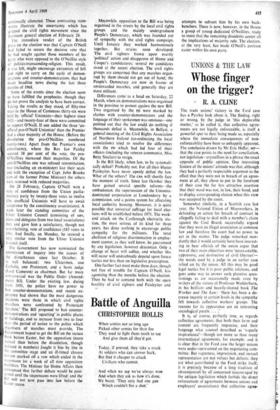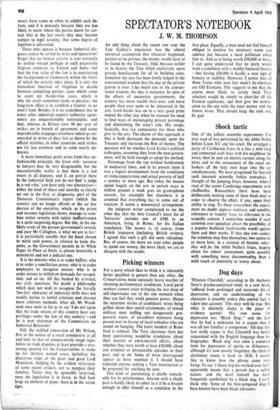Whose finger on the trigger?
UNIONS & THE LAW R. A. CLINE
The trade unions' victory in the Ford case has a Pyrrhic look about it. The finding, right or wrong, by the judge in 'this deplorable matter,' as he called it, that collective agree- ments are not legally enforceable, is itself a powerful spur to their being made so, especially where the immediate consequences of non- enforceability have been so unhappily apparent. The conclusion drawn by Mr Eric Helfer, MP— that the case points to the need for conciliation, not legislation—crystallises in a phrase the exact opposite of public opinion. One interesting feature of the unions' attitude was that, although they had a perfectly respectable argument to the effect that they were not in breach of an agree- ment at all, they chose to put in the forefront of their case the far less attractive assertion that their word was not, in law, their bond, and to display corresponding elation when this view was accepted by the court.
Somewhat similarly, in a Scottish case last year, the National Union of Mineworkers, in defending an action for breach of contract in allegedly failing to deal with a member's claim against the Coal Board, successfully argued that they were an illegal association at common law and therefore the court had no power to act in the matter. The judge remarked mor- dantly that it would certainly have been interest- ing to hear officials of the union argue that two of their main objectives were 'unreasonable, oppressive, and destructive of civil liberties'— the words used by a judge in an earlier case relied on by the union. All this may be good legal tactics but it is poor public relations, and goes some way to answer such plaintive ques- tionings as are occasionally made even by writers of the stature of Professor Wedderburn, in his brilliant and heavily-slanted book The Worker and The Law: 'there has been a de- crease recently at certain levels in the sympathy felt towards collective workers' groups The reasons for its appearance are an interesting sociological puzzle. . .
It is, of course, perfectly true, as regards collective agreements, that both their form and content are frequently imprecise, and their language what counsel described as 'vaguely inspirational'—though not more so than many international agreements, for example; and it is clear that in the Ford case the larger unions were under-represented on the negotiating com- mittee. But vagueness, imprecision, and inexact representation are not virtues but defects; they are what contributed to the Ford strike itself; it is precisely because of a long tradition of abstentionism by all concerned (encouraged by the antique legislation which forbids the direct enforcement of agreements between unions and employers' associations) that collective agree-
meats have come so often to exhibit such de- fects, and it is precisely because they are less likely to occur where the parties know for cer- tain that in the last resort they may become subject to legal scrutiny, that some degree of legalism is advocated.
Those who oppose it because 'industrial dis- putes cannot be settled by writs and injunctions' forget that no human activity is ever- normally so settled—except perhaps in such excessively litigious countries as Ireland and India—but that the true value of the law is in constituting the background or framework within the limits of which the activity takes place. It is only the immediate function of litigation to decide between competing parties; cases which come to court are border-line cases, which is why the result sometimes looks so peculiar; the long-term effect is to establish a frontier in no man's land. Besides, it is no coincidence that in every other industrial country collective agree- ments are unquestionably enforceable; and that, whereas in Britain over 90 per cent of strikes are in breach of agreement, and cause unpredictable stoppages elsewhere which go un- recorded in terms of days lost as shown by the official statistics, in other countries such strikes are far less common and in some nearly un- known.
A more immediate point arises from that un- fashionable principle, the lesser evil: recourse to lawyers may be very disagreeable, but the uncomfortable reality is that there is Oast resort in all disputes, and if, on arrival there In the industrial field you do not find `a judge In a red robe,' you have only two alternatives— either the kind of chaos and anarchy so 'clearly set out in the first, or diagnostic, part of the Donovan Commission's report (which the country can no longer afford) or the ad hoc decrees of the executive, which, as the prices and incomes legislation shows, manage to com- bine unfair severity with unfair ineffectiveness to a quite surprising degree. But this, in the un- likely event of the present government's revival, and pace Mr Callaghan, is what we are in for: it is particularly notable that the hand chosen to wield such power, in relation to trade dis- putes, as the Government permits in its White Paper In Place of Strife, is almost invariably a ministerial and not a judicial one.
It is the minister who is to order ballots; who is to order a conciliation pause; who' is to order employers to recognise unions; who is to order unions to withdraw demands for recogni- tion; and so on. All this backed by criminal, not civil, sanctions. No doubt a philosophy which does not wish to recognise the literally law-less' character of industrial strife does not readily incline to lawful solutions and chooses more arbitrary methods. After all, Mr Wood- cock once went so far as to say 'I do not agree that the trade unions of this country have any privileges under the law of this country'—and he is now chairman of the Commission on Industrial Relations!
Still, the sickbed conversion of Mr Wilson, first to the notion of a royal commission at all and later to that of comparatively tough legis- lation on trade disputes, at least provides a pro- mising opening for the Conservatilies to make up for thirteen wasted years, including the disastrous reign of the great and good Lord Monckton. Judging by the evident reluctance of some recent strikers, not to menpon their families, Tories may be agreeably surprised, once the legislation is in force, to find how large an element of paper there is in the union tiger.



































 Previous page
Previous page